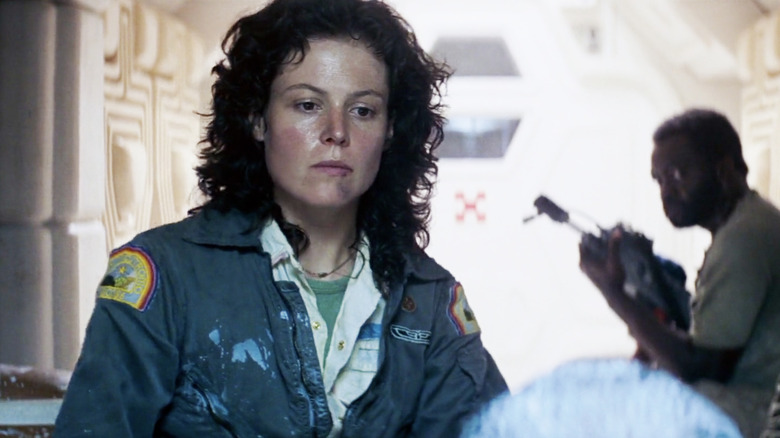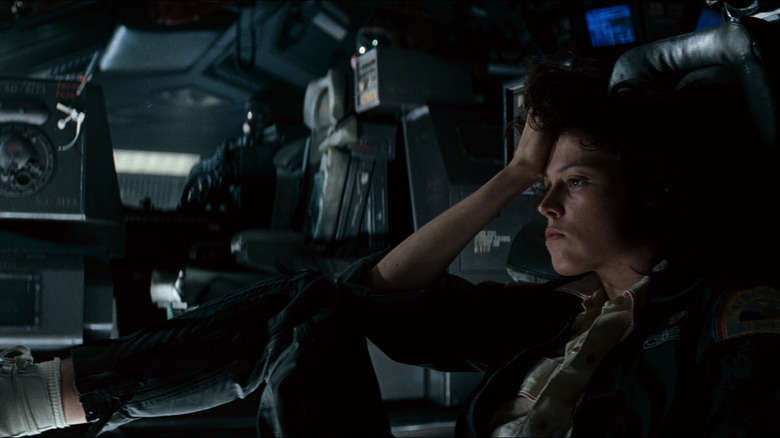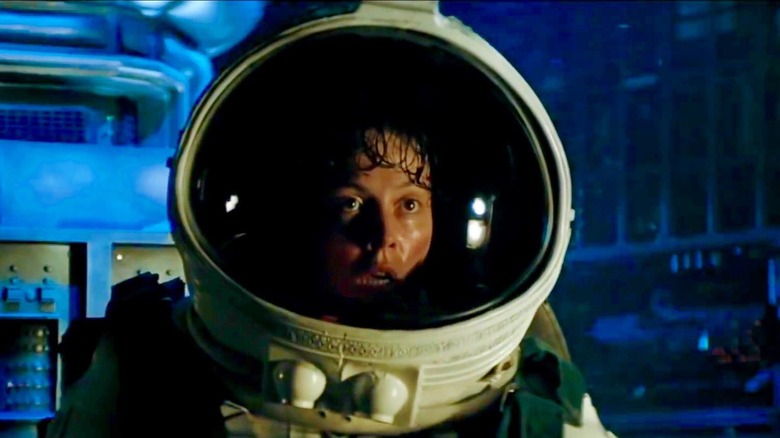How Alien Defined Sigourney Weaver — And How Sigourney Weaver Defined Alien
"In space, no one can hear you scream" is the tagline from 1979's "Alien" but in Sigourney Weaver's case, it might have been "I am woman, hear me roar."
Few actors have done as much for women in cinema as Weaver. As the ass-kicking female protagonist Ellen Ripley in Ridley Scott's horror/action/sci-fi film "Alien," Weaver paved the way for today's female action stars.
Before "Alien," women struggled to gain any kind of footing with lead roles in action films. In the 1940s and '50s, women of power were often considered deadly, as seen in the prevailing trope of the femme fatale in the film noir genre, such as Barbra Stanwyck in "Double Indemnity." In the 1970s, women were given agency but also hyper-sexualized in blaxploitation films like Pam Grier in "Coffy." Prime roles always seemed to come with a stigma attached. Then along came "Alien" and Ellen Ripley, and a little-known 28-year-old actress and a sophomore director would change Hollywood forever.
With "Alien" Scott would reinvent the sci-fi genre, taking horror to space on a limited budget. He created a gritty, industrial look opposite the seminal sci-fi film from a decade prior, "2001: A Space Odyssey." The look only heightened the horrors that would occur in the film. And then he did the unthinkable — he dropped a bold, beautiful woman in the middle of it all. Weaver's performance as Ellen Ripley came at the tail end of a period known as second-wave feminism, adding a final punctuation apropos for the movement. But at the time Weaver didn't realize how important the Ripley character would become, thinking the role was simply meant to subvert audience expectations rather than land her as the face of a Hollywood movement.
From shock value to trailblazer
Weaver told Reuters that the reason that the female Ripley was the sole survivor in the movie was purely for shock value. Even Carrie Fisher's Princess Leia from "Star Wars" two years prior — the new face of female rebellion in Hollywood — needed rescuing. Ripley, however, did more than survive. The antagonist in "Alien" is the alien species Xenomorph, a perfect killing machine described in the film as "structural perfection, matched only by its hostility." But the Xenomorph hadn't seen the likes of Ripley. No one had, certainly not in Hollywood.
By the late 1970s, American movie audiences had been programmed to expect heroes to save the day through sheer brute. Weathered tough guys like Clint Eastwood and Charles Bronson carrying big guns had become the Hollywood action hero norm. Literally no one saw Sigourney Weaver joining the club. In "Alien," Ripley rises from the rank of Third Officer to lone survivor, accomplishing what her mostly male counterparts on the commercial starship Nostromo could not. The balance of power shifts her way when the ship's captain, Dallas (Tom Skerritt), is killed. Weaver's performance becomes even more pronounced when compared with Nostromo's other woman, ship navigator Joan Lambert (Veronica Cartwright). When Dallas is hunted down by the Xenomorph, Lambert turns on the histrionics while Ripley stays cool and calmly assumes command of the ship.
Dallas' death served as a metaphorical passing of the torch for women in cinema. Weaver proved that not all heroes have Y chromosomes, and women can be action heroes defeating the most ominous of villains, even in the cold vacuum of space. Ellen Ripley offered the total package of brains, brawn, and beauty. But in "Alien" she didn't have to rely on the beauty. Ripley does the impossible and defeats the Xenomorph using cunning tactics and determination. Weaver's good looks are happenstance, a byproduct of Hollywood, but something that never comes into play in the film's narrative.
But it was never supposed to be that way.
Ripley was supposed to be a man
Before "Alien," Weaver's filmography included a couple of TV appearances and a bit part in Woody Allen's "Annie Hall." Then an also relatively unknown director, Ridley Scott took a chance on Weaver as the film's main character. The role made Weaver an overnight sensation and one of Hollywood's newest — and most surprising — action hero. But here's the thing: Ripley was supposed to be a man.
Scott told the Los Angeles Times that 20th Century Fox president Alan Ladd suggested that they make "Alien" distinct by switching Ripley's gender from male to female. Scott agreed and set about finding the perfect Ripley. He found Weaver by word of mouth in the unlikeliest of places: while she was performing in an off-Broadway play. In describing Weaver for the role, Scott said she was, "Perfect. In terms of scale, size, intelligence, her acting is just fantastic ... it was made for her, really."
But the DNA of the male action hero was still embedded in the character, and Weaver rose to the occasion. Ripley commands our respect in "Alien" through a blend of intelligence and strength. Early in the film Ripley turns to crewmates giving her a hard time and fires back, "Why don't you just f*** off." Those six words let audiences know that this was a woman not meant to be trifled with. Later, when all hell breaks loose on the Nostromo, Ripley provides the ship with a voice of reason and brute force. Ripley watches her crewmates picked off one by one and then eschews the damsel in distress trope by taking care of the alien herself. Ripley doesn't need rescuing, she's who you call when you need to be rescued.
Weaver almost blew off the audition
While the male gaze still exists in "Alien," albeit briefly during the film's climax when Ripley battles the Xenomorph in her underwear, the scene also makes a statement. It's Ripley saying, "Strip me down to nothing and I'll still use my brains – not my body – to defeat you." And while Ripley proved her worth on-screen, Weaver proved that female leads in action films can dominate at the box office. "Alien" grossed more than $100 million worldwide, spent four weeks as the number one film in America, and spawned a film franchise that has churned out a total of eight movies thus far, four of which starred Weaver. More importantly, "Alien" shattered the film industry's glass ceiling by creating a new template for females that helped level the playing field in Hollywood.
The film also showed off Weaver's range as an actor, making her one of Hollywood's hottest names for the past three decades and counting. But it almost didn't happen. Weaver told Parade Magazine that she thought the script was too bleak and almost blew off the audition. Scott eventually won her over, and she went to work creating the character. Weaver says she's proud of Ripley because, "When something bad happens, Ripley says, 'Okay, here's what I need to do.' She does her duty and never gives up."
After a successful film career that spans more than four decades and includes dozens of hits across multiple genres, Weaver has returned to her sci-fi roots with James Cameron's "Avatar" franchise, and still has high regards for the genre. Weaver believes sci-fi movies are ahead of their time, which is fitting because the same is true for her portrayal of Ellen Ripley and "Alien" in 1979.



